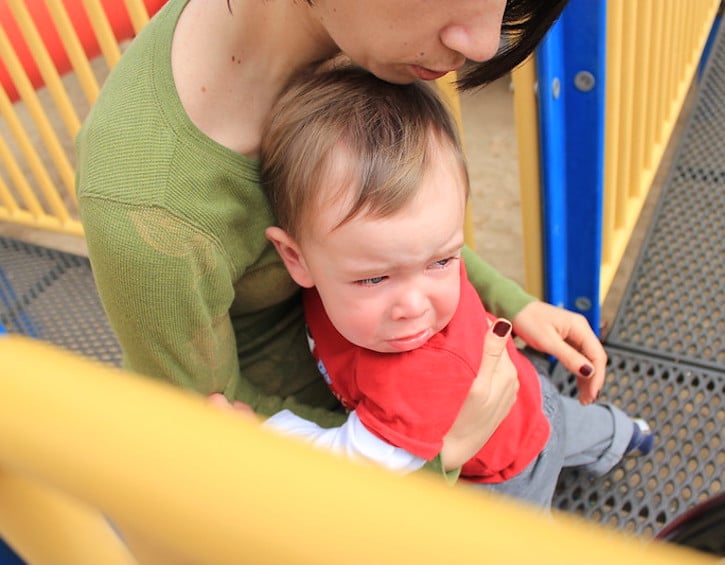
If your child is having a tantrum, check if you might be doing any of these three things that could actually be making the tantrums worse…
Ah, life would be so much easier if our little ones could just tell us what they wanted instead of doing every possible thing under the sun apart from well, telling us what’s bothering them!
Unfortunately (fortunately), healthy brain development requires they go through this important, albeit frustrating, process as they build emotional literacy and regulation. Our responses to our children during these moments also play a crucial role in how they continue to react to different stressors and triggers in their lives. So, what’s a parent to do? You’ve had a long day, your child is face-down on the play mat screaming his head off for the third time today and shows no signs of stopping. Every fibre of your being knows this might be a futile question but you have to ask anyway, “Why are you crying?”
And the crying gets worse.
Often, it seems like we’re at the losing end of a tantrum. Before you doom your next few years to tantrum hell, have a check if you might be doing any of these three things that could actually be making the tantrums worse.
Tantrum Factor #1: Asking too many questions (instead offer comfort)
We do it with the best intentions, hoping that if we can just get them to talk to us, there’s a chance we can find a way to compromise and end everyone’s misery. But have you ever met a reasonable, logical upset person who manages to articulate their feelings and needs clearly? Even the sanest adult has trouble with this when filled with negative emotions, so it would be even more difficult to expect a child to be able to do so, especially when their emotions are heightened.
In fact, it would probably trigger an even larger response because your child is likely to expect that you should know how to comfort them and can’t believe you even have to ask. More importantly, tantrums are often a result of an unmet need, and asking more questions could make your child feel even more frustrated with their inability to comprehend these feelings and verbalise their thoughts and emotions.
Asking questions is crucial in helping children process their feelings after they’ve calmed down. However, in the midst of a tantrum, it’s best to say a little less, and instead offer comfort in the form of being present, sitting with them and remaining calm so as to not add fuel to the flames. It’s true that some tantrums come at the worst possible moment and you just need it to be over as soon as possible. Stay away from a power struggle (e.g shouting over your child’s cries to get them to stop), keep calm and try picking them up or sitting close to them to establish a connection. This helps them feel wanted and supported, resulting in shorter, less intense tantrums.
Tantrum Factor #2: Reacting too quickly (instead pause to observe/reflect on how to respond)
It’s incredibly natural that your child’s tantrum triggers a quick reaction. I often have to remind myself to wait 5 seconds to breathe and suss out what might actually be happening – this gives me space to make a more informed decision on what sort of response I should be offering my child. Our response tends to give our children an indication of how serious they should be regarding the situation. For example, when a child knocks over their tower of blocks and we exclaim loudly, it usually draws a larger response from the child than if we just share our observations with them saying something like, “the tower has fallen. Would you like to build it back?” Another technique would be to change the situation entirely by adding humour and saying, “oh you’re a big giant wrecking the cities!” This helps take them out of their own default response (to get upset), and take on a different perspective as well.
Tantrum Factor #3: Brushing off their tantrum (instead acknowledge/validate their feelings)
Contrary to what we tend to think when we offer an “it’s okay”, it’s not the most effective at alleviating the situation. Instead it could come across as an easy brush off, which might trigger an even larger reaction from your child. Why? Because it can either make them feel like they’re not being heard or they’re not getting the connection they need from you to help them through this situation. Acknowledging that they may feel angry/hurt/upset over the situation is a helpful way to let them know you are present and you’re witnessing what’s unfolding in front of you. It’s important for our children to know that their feelings are all valid and very real for them so that we can then guide them through an appropriate way to let these feelings out.
Of course, the best way to deter a tantrum from becoming full-blown will be up to the individual child and some good old trial-and-error. Offering bribes and threats may seem like a less tedious way to deal, but they come with their own set of longer-term consequences and do not contribute to your child’s overall emotional literacy or conflict management skills.
If this topic has been of interest to you and you’d like to find out more about nurturing your child, do check out The Bright Life’s new parent curriculum that’s rooted in Montessori and psychology. The Bright Life runs regular workshops to provide parents with tailored support for their journey. Visit www.welcometothebrightlife.com for more details.






 View All
View All




 View All
View All









 View All
View All







